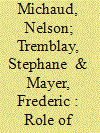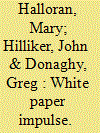|
|
|
Sort Order |
|
|
|
Items / Page
|
|
|
|
|
|
|
| Srl | Item |
| 1 |
ID:
178199


|
|
|
|
|
| Summary/Abstract |
Foreign policy statements—and, namely, white papers—offer diplomats, civil servants, and the general public, as well as international actors (friends and foes alike) an understanding of what motivates a country to engage in international issues. They are fundamental government declarations intended to direct the policy process toward its political and operational objectives. Is history embedded in the message these statements carry? And, if so, how is history used? Relying on Brands and Suri’s typology and framing categories (factual/normative), this article explores white papers issued by governments led by Pierre Elliott Trudeau, Jean Chrétien, Paul Martin Jr., as well as the 2017 House of Commons statement by Justin Trudeau’s foreign affairs minister, Chrystia Freeland. Based on Canada’s tradition of Pearsonian internationalism, we hypothesize that the factual use of history would prevail. We find this to be the case, but with important nuances.
|
|
|
|
|
|
|
|
|
|
|
|
|
|
|
|
| 2 |
ID:
138291


|
|
|
|
|
| Summary/Abstract |
Three times in the span of 12 years (1968–1980), the foreign policy of the Canadian government was subjected to review by the Department of External Affairs. Although only the first of these efforts resulted in a white paper formally tabled as such in the House of Commons, subsequent reviews tended to follow the design of the first: a comprehensive examination of all aspects of the country’s foreign policy, led and coordinated by senior officials in External Affairs, drawing to varying degrees on expertise from other government departments and the private sector. In all cases, the reviews were intended to produce a document that would guide future policy. They served as useful tools not only for new governments seeking to differentiate their policies from those of their predecessors, but also for those in search of answers to challenges arising in the course of their mandates. This article analyzes the reviews undertaken between 1968 and 1980 and the circumstances that gave rise to them in an effort to account for the popularity of the white paper process among policymakers and to explore the process’s influence on policies subsequently pursued.
|
|
|
|
|
|
|
|
|
|
|
|
|
|
|
|
|
|
|
|
|